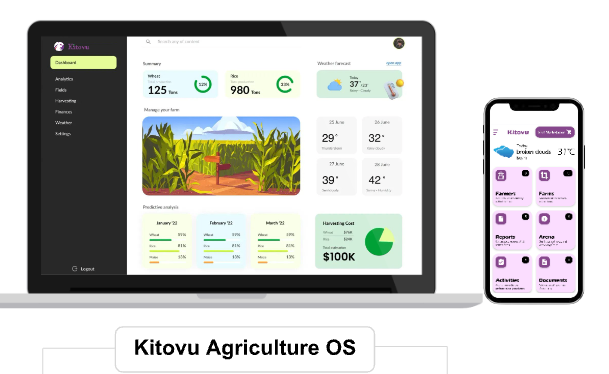This interview is brought to you by Startup Booster. Market your company with rapid, effective promotion across startup and business blogs.
Name: Emeka Nwachinemere
Company: Kitovu Technology Company

What are you building, and who benefits most from it?
Smallholder farmers who typically work 2- to 4-hectare farms realize low yields compared to global averages. Post-harvest, 40% of yields are lost due to poor storage and lack of access to markets, which impacts farm-level productivity and farmer incomes. These problems arise because farmers rely on guesswork, instinct, and traditional knowledge to make operational decisions. We started Kitovu to solve these problems.
At Kitovu Technology Company, we build climate-smart farming and post-harvest infrastructure to support African agriculture, enabling smallholder farmers to optimize their productivity and incomes. Kitovu has built three main products that support climate-smart farming and enable access to post-harvest infrastructure: YieldMax, eProcure, and StorageX.
YieldMax applies data science and remote sensing to provide smallholder farmers with a personalized agronomic advisory that delivers operational insights, input specifications, and crop health audits. At harvest, we match the farmers’ produce to partner buyers through our eProcure service. We also provide access to effective storage and access to finance through StorageX, a platform that leverages electronic warehouse receipt systems to transform farmers’ goods under storage into collaterals.
What is one of your startup’s most impressive accomplishments?
182 founders interviewed so far. Get interviewed in 10 minutes, via a simple form, for free.
Kitovu Technology Company currently supports over 16,000 smallholder farmers, working with a 20-member team and a 317-person network of community-based agents. We did that completely bootstrapped.
What has been the biggest challenge so far, and how did you overcome it?
Our biggest challenge has been the fact that smallholder farmers have very low purchasing power, are not literate, and have no smartphones. To address this challenge, we adopted the use of community-based agents who become our last-mile touch points with farmers, using the technology we have developed on behalf of the farmers. This not only solves the challenge of literacy and smartphone ownership but also creates jobs for community-based agents. Additionally, we provide our services to the farmers on a post-paid basis, allowing them to pay at the point of sale of their harvests. This removes the barrier that low purchasing power creates.
What tool or app could you not live without and why?
Google. It is always a great resource for identifying what I need to learn to keep building.

What marketing strategies have worked for you?
Kitovu’s go-to-market strategy is divided into farmer-facing and commodity buyer-facing strategies.
To reach smallholder farmers, we leverage the following channels:
- Trained commission-based agents
- Reach-out to farmer-based organizations
- Farmer engagements at town hall meetings and demo farm trials
To reach commodity buyers, we leverage the following channels:
- Social media marketing on Facebook, Linkedin, Twitter, and Instagram
- Industry events and exhibitions
- Referrals
This is what has worked for us so far.
Can you share any financial data about your startup?
We recorded $262,000 in annual revenue last year. (Reported on July 11, 2023.)
What has been your biggest business failure to date? What did you learn from it?
Our biggest business failure occurred when we launched StorageX. With this product, we offered smallholder farmers the opportunity to store their goods at no upfront cost. Additionally, they would use their grains under storage as collateral for financing. We put in the work to set up six storage infrastructures, including dryers, moisture meters, and hermetic storage bags. At launch, we had over 17,000 farmers interested in using the StorageX service, the major attraction for them being the ability to leverage their goods as collateral to receive financing.
Everything was going well, but then disaster struck. The banks we had talked to about financing the warehouse receipts pulled out, saying the interest rate was too low for them. They needed us to have more collateral or deposit up to 40% of the loan portfolio they would extend to the farmers. They expected grains to be already stored in the warehouse even though the service hadn’t launched yet. We were devastated, but we picked ourselves up off the floor and found a way to move on. First, we turned down over 90% of the farmers and financed the rest ourselves. Then we shouldered the loss due to reduced storage infrastructure usage.
The whole thing taught us that if there are highly significant aspects of your product or service that you don’t control, you open yourself up to disappointments and failures, as we did. Now, we try to determine what the risks are and figure out how to solve that. We still turn down 90% of the farmers interested in using the StorageX service due to financing constraints, but it’s not because someone sprung a surprise on us.
What’s the best specific piece of advice you have for other entrepreneurs?
Building a business is not a sprint; it’s a marathon, so remain focused and patient. Many plans may go haywire, but you need to stay true to your vision. Don’t let anyone or anything distract or frustrate you, especially when you have not raised funding and everything is awash with fundraising announcements. Your time will come, so refuse to measure success by another person’s fundraising calendar. If you do all you need to do and still don’t get funding, focus your mind and efforts on the ultimate funder—your clients!
Want to be interviewed just like this? Fill out this simple form.



